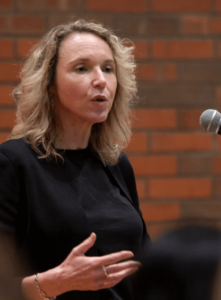by The Cowl Editor on October 31, 2019
News
by Alexandra Huzyk ’20
News Staff
On Wednesday, October 23, Women in STEM hosted their third event, inviting speakers Dr. Amanda Lynch and Ava Calle ’12 to talk about the challenges and opportunities that they have faced pursuing careers within the STEM field.
Lynch, a climate scientist currently teaching at Brown University, obtained a Ph.D. in atmospheric science from the University of Melbourne in 1993. She began as an undergraduate pursuing degrees in electrical engineering and physics, but quickly switched to applied mathematics due to her negative experiences in the realm of laboratory science.
“In engineering and chemistry labs, I didn’t feel welcome, and I was called on to repeatedly demonstrate my competence,” Lynch said. She shared that “having your competence and belonging questioned over and over again, you start to internalize that,” and it is important to remember that “you do belong and you are competent.”
In her presentation, Lynch described data from a 2015 study in which 100% of 60 women scientists had reported encountering one or more patterns of gender bias in the workplace. These experiences were even more pronounced for women of color, who were often questioned whether or not they were supposed to be in labs after hours.
In terms of computational science, Lynch explained, “Women have really been at the forefront of coding, and in fact made up the majority of computer operators, until the ’80s when these numbers plummeted.”
During the 1980s, Lynch explained that people started to think that it was necessary to have knowledge of computers or a love of gaming in high school in order to pursue it in college. “This shift in culture really influenced the uptick of women in science; especially in an area like climate science, which is heavily computational,” said Lynch.
Throughout this change in culture, Lynch continued to code and became the first woman “Scientist 1” at a research center while working towards her Ph.D. However, with this achievement she also became the object of scrutiny. Male supervisors would constantly send female secretaries to check up on her, she received minimal support and guidance, and she was not considered for required computational resources to complete her work. Due to these gender biases, Lynch decided to change Ph.D. programs to another university.
As a climate scientist, Lynch said she started to become involved in field science while she was completing her Ph.D. and then more heavily as a post-doc. “I was very choosy about situations I chose to put myself in,” said Lynch. “I only took positions in which I was the lead researcher… and only with researchers I knew and trusted.” This is due to the issue of sexual harassment and assault in field experiences.
Although Lynch said that she has never personally experienced any form of sexual harassment in this domain of field science, she provided data which reports that harassment affects women more than men in these particular scenarios.
In order to navigate these situations, while pursuing a career in the STEM field, Lynch encouraged the audience to network with both female and male allies. Additionally, she said, “Support other women, refer them, cite them, nominate them. You can do your part, in very concrete ways, whenever you have the opportunity.” Lastly, Lynch stressed the importance of being stubborn and re-submitting proposals and work, especially in the field of academia.
Ava Calle, a Program Specialist and Board Certified Behavior Analyst (BCBA) in the Intensive Instruction Program at The New England Center for Children, presented after Lynch. Calle graduated from Providence College with a BA in psychology and a pre-health minor, and went on to obtain an MS in applied behavior analysis from Western New England University.
She began her presentation by considering the familiar question, “What do you want to be when you grow up?” She pointed out that this question becomes more weighted when you get older and, especially, as you go on to college. Calle said, “It seems like the question might be insinuating how successful you want to be.”
Calle shared that she knew she liked the sciences and people, and would typically answer the question by saying she wanted to go into psychiatric nursing or neuroscience—without actually being convinced of these statements herself.
During her time at PC, Calle conducted research in a cognition lab and completed an internship at the Groden Center. These experiences exposed her to research and design, as well as applied behavioral analysis. Particularly at the Groden Center, Calle was exposed to children with autism, severely challenging behavior, and students who communicated non-verbally.
In her current position at the NECC, for autism education and research, Calle has continued to ask questions as a researcher while also providing direct care as a teacher. She shared that she is still trying to figure out what she wants to be when she grows up, and where her career path will take her. She urged the audience to “think about who you want to be, not just what you want to be when you grow up.”
As for Calle’s suggestions for PC undergraduates, Calle recommended finding a mentor. “There are very strong females in my field. They are researchers and they are mothers and they are wives, and someone has probably been in your position before you.” She also suggested asking for feedback on your performances and always continuingto ask questions.
After both speakers presented, the audience was encouraged to ask questions. One student asked, “For the people in this room who don’t necessarily know what they want to do yet, what would you give them for advice?” Lynch suggested test driving careers, particularly in summer internships or working in a lab with a professor.
Calle said, “Utilize the network and the people in your department, but also other faculty at Providence College and get in touch with alumni. Don’t assume that if their title is X at that point, that they didn’t go through similar situations and jobs.”
